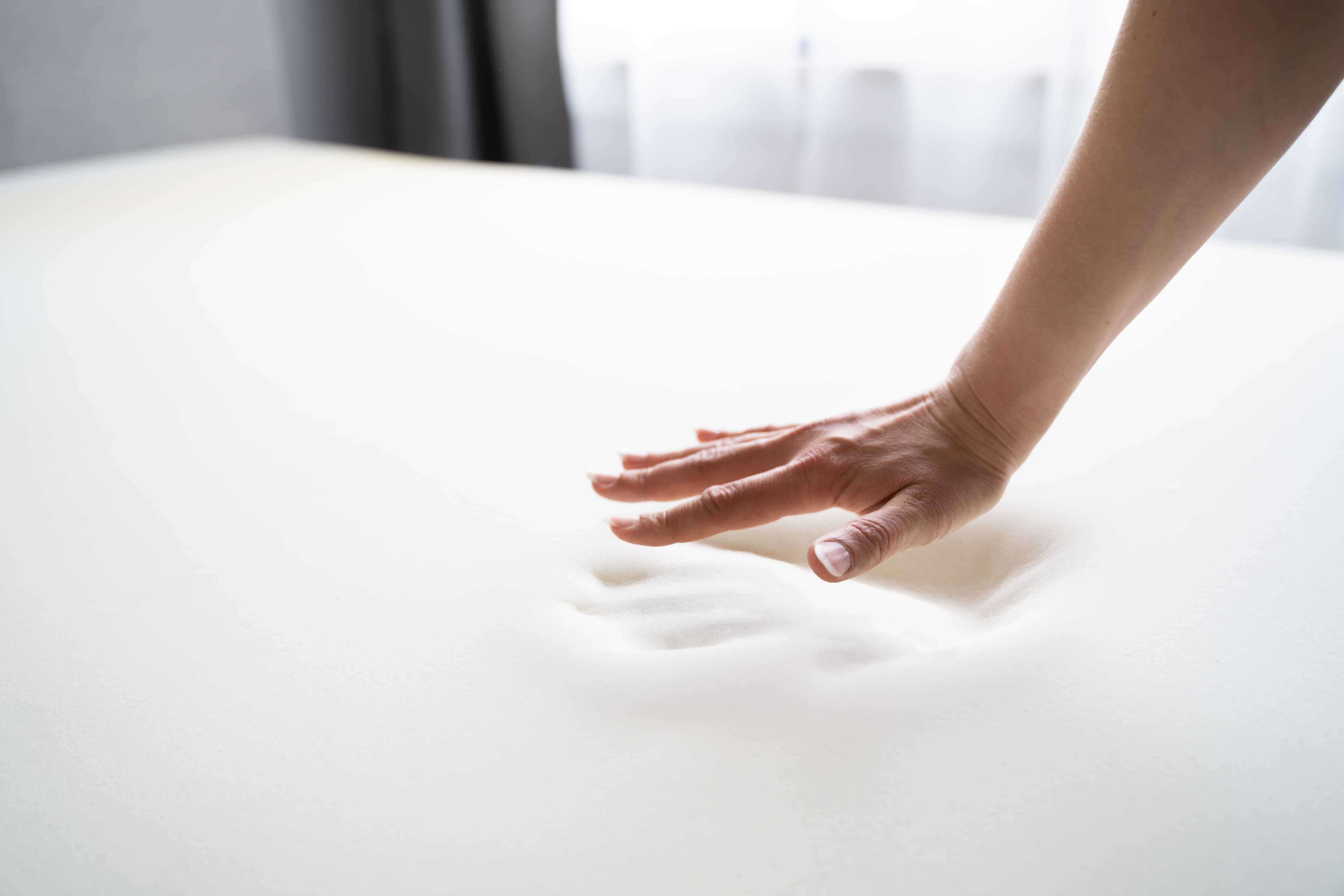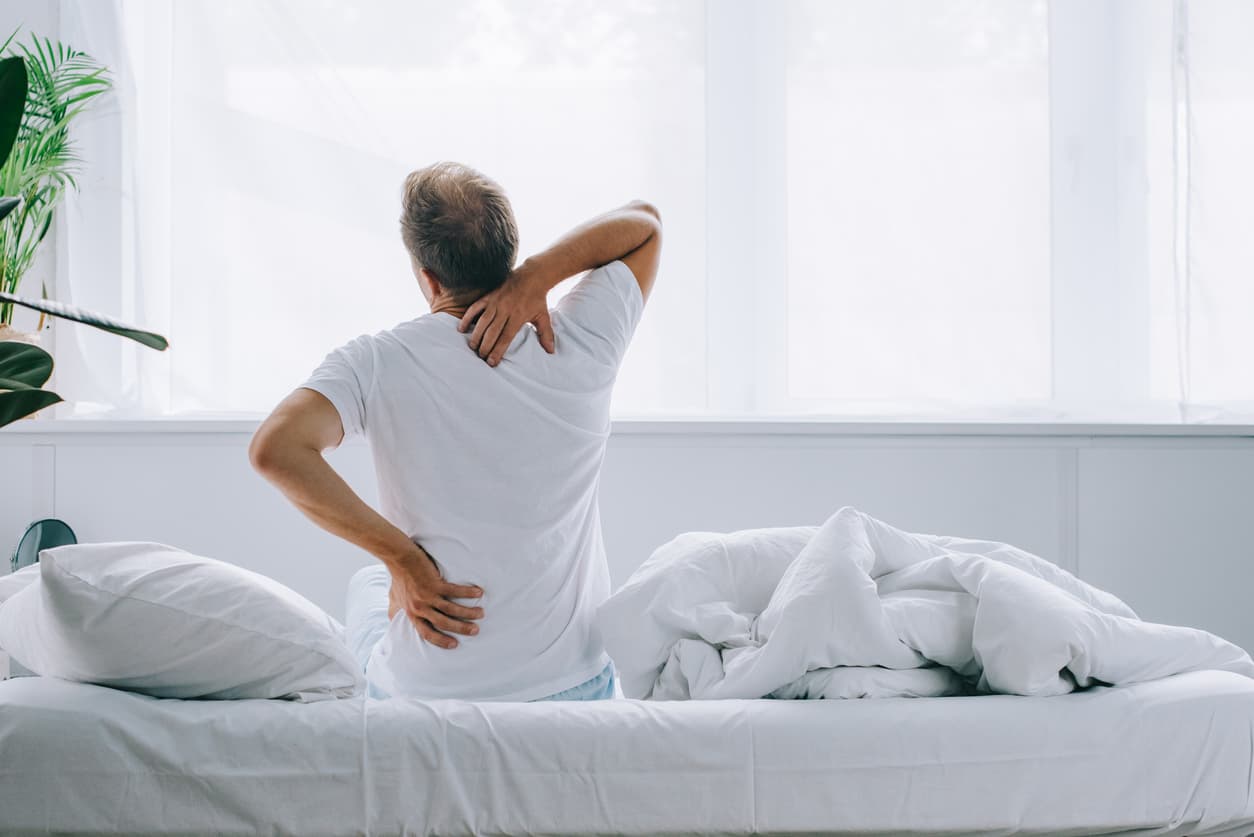You know the feeling.
It's 2 AM. Your eyes are closed, but your mind is racing. You're thinking about tomorrow's meeting. The sleep you’re losing right now. Bills you need to pay. Your body feels exhausted, but you can't fall asleep.
You're not alone. 68% of adults regularly experience sleep disturbances directly linked to chronic stress. Stress changes how your body functions, ruins sleep quality, and creates sleep disorders that last long after stress fades—creating a vicious cycle.
The good news? You can break it. This guide explains how stress affects sleep and gives you proven strategies for better sleep starting tonight.
Key Takeaways
Stress activates your body’s fight-or-flight response, making it hard to fall and stay asleep.
Poor sleep increases cortisol levels, exacerbating stress and creating a vicious cycle.
Watch for warning signs like long sleep latency, night wakings, or waking up tired.
Calm your mind with 4-7-8 breathing, brain dumps, and a relaxing sleep environment.
Build long-term sleep habits with consistent schedules and daily stress management.
Seek professional help if sleep issues persist for 90+ nights. Look for mattresses with an innovative, durable design and medium to medium-firm support. Check out the range of award-winning mattresses at Leesa to get started.
How Stress Actually Disrupts Your Sleep
Stress doesn't just make you jittery at bedtime—it triggers real changes in your body that physically prevent you from getting healthy sleep.
Your Mind Won’t Turn Off
It may sound implausible, but stress-induced insomnia is actually a survival mechanism. Our ancestors were stressed about predators and natural disasters, and sleeping through these threats was a good way to die. Congratulations, your bloodshot eyes and irritability are the result of thousands of years of evolution.
The way it works is that nighttime stress triggers your fight or flight. This is your hormonal response to danger and is controlled by your hypothalamic-pituitary-adrenal (HPA) axis. In short, your hypothalamus tells your pituitary gland to start cranking out stress hormones, getting you ready for any threat.
The most important of these stress hormones are cortisol and adrenaline. When they start going, your heart rate increases and your muscles tighten. You may also experience the following physical responses:
Elevated blood pressure
Bloating
Loss of appetite
Diminished sexual desire
Shortness of breath
Along with the physical manifestations of stress, these hormones trigger racing thoughts caused by a heightened sense of vigilance. Your mind jumps from one idea to another, and you experience a feeling of anxiety. You won’t be able to sleep, and your mind will feel incredibly ‘awake.’
This is a very helpful hormonal response when you’re avoiding a traffic collision, but terrible at 3 AM when you’re exhausted and stuck staring at the ceiling.
How Sleep Impacts All Areas of Your Life
A good night's sleep isn’t a simple want; it's a need. You can’t solve the effects of long-term insufficient sleep with extra caffeine and a can-do attitude. Poor sleep impacts all areas of your life.
Physical health: Impacts normal body functions leading to possible weight gain, heart attack, dementia, type 2 diabetes, reduced immunity, and even cancer.
Mental health: Impairs decision-making, problem-solving, emotional control, and adaptability. Linked to depression, suicidal thoughts, and increased risk-taking behavior.
Social/emotional health: Limits the ability and desire to socialize. Limits the ability to empathize with others and understand one's own emotions.
Losing just 1–2 hours of sleep a night can harm you as much as going without sleep for a day or two. That’s how necessary regular sleep is for daily function and general health.
The Vicious Cycle: When Poor Sleep Makes Stress Worse
Sleep loss and chronic stress are connected—poor sleep amplifies stress levels, creating a self-perpetuating vicious cycle that damages overall health.
Sleep loss and stress are reciprocally connected. They create a cycle of poor sleep, frustration, and bad work performance. This reality goes back to the hormone cortisol. Both poor sleep and stress result in increased cortisol levels.
Symptoms of elevated cortisol include:
Difficulty concentrating
Weight gain around the face and abdomen
Acne
Easy bruising
Flushed face
Slowed healing
Muscle weakness
Severe fatigue
Irritability
High blood pressure
Headache
High cortisol can also increase your risk of developing long-term conditions like cardiovascular diseases, osteoporosis, and diabetes.
Now, it’s normal to feel anxiety and stress at the onset of these symptoms, but this stress may then contribute to elevated cortisol and make it difficult to fall asleep and stay asleep. Sleep difficulties, in turn, lead to increased cortisol secretion during the day, making all of your symptoms that much worse.
It’s a true lose-lose scenario, and it’s normal to become depressed. You’ve been caught in a terrible cycle of sleeplessness and irritability. The good news is that you can take productive, strategic steps to break the cycle and achieve normal sleep again. Let's get started.
5 Signs Stress Affects Your Sleep
Recognizing stress-related sleep challenges helps you to address them before they become bigger problems in your overall life and health.
1. Difficulty Falling Asleep (30+ Minutes Regularly)
Most healthy adults take around 20 minutes max to fall asleep. This time period, called sleep latency, varies from person to person and may change depending on your daily activity level and bed setup.
If your sleep latency is regularly longer than 20 minutes, reaching half an hour or more, then this is a warning sign. Long sleep latency doesn’t necessarily mean you’re facing a stress-related sleep issue. Perhaps you’re in a new sleep environment where it’s hard to relax. Perhaps you’re feeling unwell or experiencing muscle soreness.
However, if you can only contribute your wakefulness to racing, uncontrollable thoughts, then you may be facing a stress problem.
2. Frequent Night Wakings
Problems staying asleep, like frequent 2 or 4 AM wake-ups, are also a sign of stress-related sleep challenges. It’s not uncommon to experience a brief sense of wakefulness in between REM cycles. The issue is when you fully wake in the night and struggle to fall back asleep.
Some stressed sleepers even suffer from nocturnal panic attacks, causing them to wake in the night with a racing heart and covered in sweat. These incidents are more common for those with existing panic disorders, but can also be triggered by stress alone.
3. Waking Too Early
It happens to the best of us. You wake up before your alarm, check the time, and then snuggle back into bed, glad for the extra shut-eye. Except, unfortunately, you just can’t fall back to sleep.
Regularly waking before your alarm and not falling back asleep is definitely a sign of a stress-sleep issue. This is especially true if you:
Can’t stop planning for your day
Start panicking over the events of yesterday
Feel your heart beat pick up and a sense of ‘wakefulness’
4. Feeling Tired Despite Sleeping 7-8+ Hours
You fall asleep at the right time and wake with your alarm, getting the ideal 8 hours for adults. Strangely, though, you go through your day exhausted, struggling with daytime sleepiness. What’s the deal? You may be getting poor quality sleep without even noticing it.
Poor quality sleep is often caused by stress, poor sleep habits, and chronic health conditions. You may not realize you’re waking in the night or unable to enter restorative sleep.
5. Physical Stress Symptoms at Bedtime
We’re back to the physical manifestations of your stress. Tension, a racing heart, and general restlessness before bed are all signs of a stressed-out body. You’re about to go to bed, not run a race; you shouldn’t be feeling like this.
The worst part is that, over time, your body starts associating bedtime with these symptoms, setting you on a destructive, stress-filled path.
How to Sleep When Stressed and Anxious: Your Tonight Action Plan
These evidence-based relaxation techniques can improve sleep quality starting tonight, even when chronic stress feels overwhelming.
Try the 4-7-8 Breathing Method
Need to relax fast? The 4-7-8 technique is like a reset button for your nervous system. You can slow your breath, thereby activating the body’s relaxation response, lowering stress, and helping you drift into sleep mode.
Here's how it's done:
Sit or lie down comfortably. Rest your tongue just behind your top front teeth.
Exhale completely through your mouth with a gentle “whoosh.”
Inhale through your nose for 4 seconds.
Hold that breath for 7 seconds.
Exhale through your mouth for 8 seconds, making that same “whoosh” sound.
Repeat up to 4 times.
This rhythmic pattern signals your brain to calm down, slows your heart rate, and melts away tension. It may take some practice to master.
Do a Brain Dump Before Bed
This is an excellent method to manage stress and anxiety as well as relaxing you before bed. A ‘brain dump’ gets rid of all of tomorrow's stress before you try to fall asleep, getting ahead of racing thoughts.
Use the following step-by-step method.
Grab a notebook and pen.
Set a 5–10 minute timer.
Write every worry on your mind.
List tomorrow’s tasks, including errands, emails, calls, and deadlines.
Prioritize with stars, marking the top three must-dos for tomorrow.
Close the loop—read your top three, shut the notebook, and place it away.
Tell your brain you’re done for today, and start the rest of your wind-down routine.
Optimize Your Sleep Environment Fast
Your sleep environment has a huge impact on your sleep and your stress levels. A cluttered environment, a hot room, and a lumpy mattress prevent good sleep. Starting tonight, you can:
Use existing shades to block out light
Turn all lights off
Use your phone (plugged in) to play white noise or calming music
Wash sheets and bedding
Make your bed
De-clutter and organize your bedroom
Turn on a fan to decrease the room temperature
Avoid eating within 2 hours of going to bed
Avoid Blue Light and Screens
Blue light, the light from your phone and television, disrupts circadian rhythm and melatonin production. It’s best to avoid blue light at least 2-3 hours before bed. This means setting down the phone and turning your show off.
Instead, try winding down with a good book, running a warm bath, or practicing meditation.
Building Healthy Sleep Habits for Better Sleep
Sustainable improvement requires establishing healthy sleep habits that support your ability to manage stress and achieve consistent sleep quality.
Keep a Consistent Sleep Schedule
The human body thrives on consistency. Going to bed and waking up at the same time every single day will do wonders for your sleep quality and stress levels.
It can be difficult to keep to a schedule, especially if your sleep is out of whack. Start by limiting naps and coffee/alcohol intake. Set a bedtime routine that gets you at least 7 hours of sleep and give yourself at least 2-3 hours to settle down before bed.
Manage Stress During the Day
If you spend the whole day building stress and pushing down your feelings, then you’ll have no choice but to explode with anxiety at night. Remember, even ‘good’ things like a new hobby or an exciting project at work can cause stress. You can manage all kinds of daily stress with a combination of exercise, mindfulness, and strategic planning.
Exercise takes the edge off stress by releasing endorphins, damping its physical effects, and boosting mood, sleep, and focus—plus it gives your mind a healthy distraction.
Mindfulness interrupts the stress cycle, creating space to respond instead of react via mindful breathing, guided imagery, and present-moment attention.
Strategically plan to reduce daily stress by removing stressors when you’re already on edge. For example, rescheduling a friend meet-up if you need to relax.
Fix Your Sleep Environment
When it comes to sleep quality, your mattress and environment make a significant impact. We mentioned optimizing your sleep environment by maintaining a cool temperature, keeping it dark, controlling noise, and keeping the space clean.
A quality bed setup can also increase deep sleep and optimize your REM cycle. Your new mattress, pillow, and cover quality must fit your unique needs and lifestyle. For example, if you’re sleeping with a partner and a horde of pets, then a King or California King may be best.
When Poor Sleep Persists Over 90 Nights
If sleep disturbances last more than three months, cause daytime impairment, or occur with depressive symptoms, it's time to see a sleep medicine specialist.
Signs You May Need to Speak with a Specialist
Not all sleep issues can be solved with a comfy mattress and a mindfulness routine. Challenges like chronic insomnia, suspected sleep disorders, and severe anxiety and depression may require professional assistance.
Your health and your sleep are worth it. If you need support, reach out to a medical provider and make an appointment with a sleep medicine specialist.
Treatment Options That Work
Only a qualified sleep professional can treat sleep and health disorders. They may prescribe common treatments like Cognitive Behavioral Therapy for Insomnia (CBT-I), medications when appropriate, and possible sleep study.
About a third of adult Americans struggle with less-than-ideal sleep, so you’re not alone. Treatments are available, and they can make a big difference.
Fixing Stress-Related Sleep Problems
You have more control over the relationship between stress and sleep than you might think—understand the connection and make a change tonight.
Stress doesn’t get the final say in sleep—you do. Better sleep starts with understanding the stress-sleep connection. Calm your nervous system, clear your mind with a quick brain dump, and create a sleep environment that actually supports rest.
Layer in healthy daily habits like consistent bedtimes and mindful stress management, and you’ll build lasting change one night—and one new mattress—at a time. Start tonight, trust the process, and let deep, restorative rest become your new baseline.
FAQs
Can stress cause sleeping problems?
Yes, short-term stress can trigger temporary insomnia; severe or prolonged stress may lead to chronic insomnia. The body’s hormonal stress response makes it difficult to fall asleep and stay asleep.
What are 5 warning signs of stress?
They are as follows:
Difficulty falling asleep for 30+ minutes on a regular basis: Taking longer than 20 minutes to fall asleep regularly can signal stress or discomfort in your sleep environment.
Frequent nighttime awakenings: Waking up fully in the night and struggling to fall back asleep often points to stress-related sleep disturbances.
Waking up too early and being unable to fall back asleep: Rising before your alarm with a racing mind or anxiety is a common stress indicator.
Feeling tired despite getting 7–8+ hours of sleep: Stress can reduce sleep quality, leaving you exhausted even after a full night’s rest.
Experiencing physical stress symptoms at bedtime: A racing heart, tension, or restlessness before bed suggests your body is stuck in stress mode.
How to sleep when stressed and anxious?
The trick is calming your body and mind before bed. Begin by resetting your nervous system with the 4-7-8 breathing method: inhale for 4 seconds, hold for 7 seconds, and exhale for 8 seconds. Next, do a brain dump—write down tomorrow’s tasks and worries to stop mental spiraling.
Optimize your sleep environment by darkening the room, lowering the temperature, and decluttering. Avoid blue light for 2–3 hours before bed to support melatonin production. These simple actions help your body shift from “fight or flight” into “rest and restore.”
What causes stress when you sleep?
Nighttime stress often stems from your body’s fight-or-flight response kicking in just as you’re trying to rest. The hypothalamic-pituitary-adrenal (HPA) axis releases cortisol and adrenaline, increasing heart rate, tension, and mental alertness. This can lead to racing thoughts, physical restlessness, and a heightened sense of vigilance—your brain essentially mistakes nighttime for danger time.
In some cases, this stress is anticipatory (worrying about tomorrow) and can evolve into sleep anxiety, where the fear of not sleeping actually keeps you awake.



